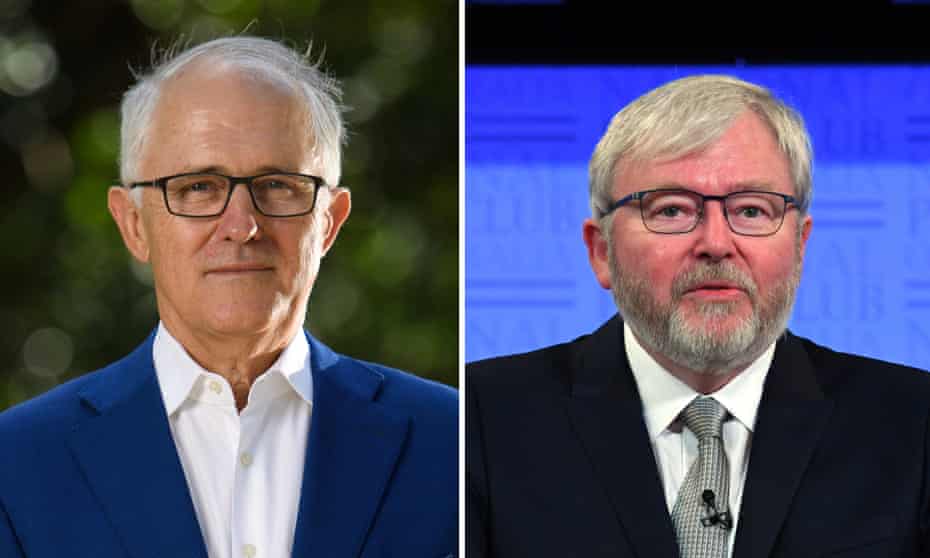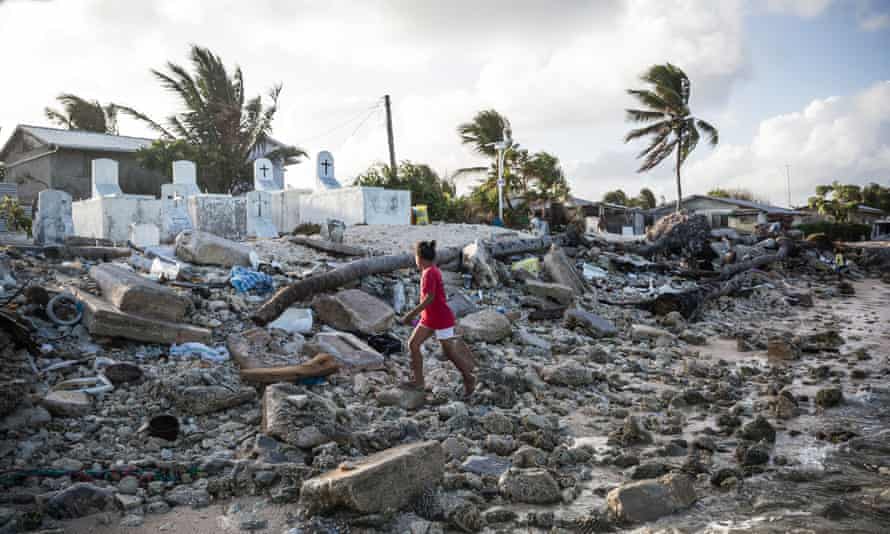Former PMs apologise to Pacific leaders for Australia’s apathy on climate crisis
Kevin Rudd and Malcolm Turnbull lash out at Morrison government’s ‘cynical indifference’ and assure Pacific leaders ‘a majority’ of Australians ‘are in your corner’

Last modified on Sat 23 Oct 2021 01.23 EDT
Former Australian prime ministers Kevin Rudd and Malcolm Turnbull, and former foreign affairs minister Bob Carr, have accused the Morrison government of “cynical indifference” and “empty rhetoric” when it comes to climate action, saying the commitment to achieve net zero emissions by 2050 was the “bare minimum” that needed to be done.
The broadside came in a letter to Pacific leaders, in which the Australian politicians said they shared the “alarm and disappointment” of Pacific heads of government at the suggestion Australia will not table a new and increased target for the reduction of emissions ahead of the Cop26 summit in Glasgow next month.
“As you know, the Paris agreement requires nations to step up their short-term national ambition every five years. Glasgow is all about what countries plan to do by 2030 to reduce emissions … Australia can and should do much more,” they wrote.
“Promising net zero by 2050 is the bare minimum and a promise Prime Minister Morrison first made at the Pacific Islands Forum in August 2019. But without accelerated cuts in emissions in the near and medium term, a net zero by 2050 promise has no credibility.”
The former leaders said they had taken the “somewhat unusual step” of writing to Pacific leaders as a sign of their respect for the region and in recognition of its importance to Australia.
The Pacific region is one of the areas considered most vulnerable to the impacts of the climate crisis, and its leaders have had an outsized impact on the global fight.
“With Glasgow less than two weeks away, we want you to know that millions of Australians are just as disappointed with our government’s lack of action as you are,” the letter reads.
“At Cop26 we know you will press for high ambition action that will limit warming to 1.5 degrees and continue to lead by example. Be assured of one thing: a majority of the Australian people, and all our state and territory governments, are in your corner … Do not be disheartened by the cynical indifference or the empty rhetoric from Canberra.”

Rudd, Turnbull and Carr said that the obstacles to climate action in Australia were “not economic” but rather were the result of “the vested interests of the coal and gas industry coupled with rightwing populist media and politics”, which they accused of being “the most intractable opponents to cutting emissions faster and sooner”.
The former leaders sought to distance themselves from the stance of the Morrison government, criticising particular policies of the current government.
They singled out the decision to reorient the emissions reduction fund “in the pursuit of so-called ‘clean coal’ or carbon capture and storage – a technology which is a thoroughly proven failure now used by the fossil fuel lobby to delay the transition to renewables.”
The emissions reduction fund is a scheme established under Tony Abbott that pays farmers and businesses to cut carbon dioxide emissions below what they would have otherwise been.
The letter was also critical of a controversial proposal to create a $250bn loan facility for the resources sector in return for National party backing for a net zero emissions target, put forward by Nationals MP Keith Pitt and endorsed by the current and former leaders of the National party Barnaby Joyce and Michael McCormack.
“Of course, the beneficiaries of these subsidies would be overwhelmingly foreign-owned miners,” wrote Rudd, Turnbull and Carr.
The former leaders claimed to speak for “millions of Australians [who] expect their government to raise our ambition and move faster to cut emissions”, saying these Australians also wanted Australia to rethink the way climate finance was delivered – calling for Australia to participate in the Green Climate Fund, the primary multilateral vehicle that delivers climate finance.
Australia stepped back from the Green Climate Fund in 2018 and has opted to provide climate aid largely through bilateral partnerships, including committing to provide hundreds of millions in funding to help Pacific nations invest in renewable energy and climate and disaster resilience.
This money has come from the existing aid budget, something Rudd, Turnbull and Carr are critical of, saying they wanted to see “real increases in aid for climate adaptation, not shuffling money from one side of the aid budget to the other”.
The Prime Minister’s Office has been contacted for comment.

